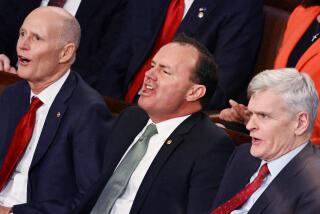Bentsen Vows to Block Tax Plan : But He May Back Modest Incentive for Capital Gains
- Share via
WASHINGTON — Senate Finance Committee Chairman Lloyd Bentsen (D-Tex.) vowed Monday to block the temporary capital gains tax cut approved by the House last week but he left open the possibility that he might support a more modest tax incentive for profits from investments.
“We’ll look at what’s proposed,” Bentsen told reporters after the committee met behind closed doors for about four hours to discuss his plan to raise $5.4 billion in added revenues to meet a congressional deficit-reduction target.
Bentsen appeared to have the votes to thwart a Republican plan sponsored by Sen. Bob Packwood of Oregon that would lower rates gradually on capital gains over a six-year period. Moreover, Sen. David L. Boren (D-Okla.), a key swing vote who had been seeking to win support for his own capital gains proposal, apparently threw in the towel on his own plan by disclosing that he would not offer it in committee.
Modest Incentive Seen
If Bentsen can stop the Republican proposal in committee, that would probably leave the possibility of providing a relatively modest capital gains incentive for small businesses and new ventures.
Bentsen said that the panel, which will begin formally drafting a tax bill today, favors a proposal he offered that would raise the limits on outside earnings for Social Security recipients.
Starting in 1991, the proposal would allow Social Security recipients between the ages of 65 and 69 to earn as much as $14,500 without losing any benefits.
Under current law, Social Security recipients in that age group are limited to about $8,800 in outside earnings before they have to give up some of their benefits. The ceiling is scheduled to rise with inflation to more than $9,500 in 1991.
Last week, the House backed a capital gains measure supported by the White House that would cut the top rate to 19.6% through the end of 1991, from the current maximum of 33%. Strongly opposed by Democratic leaders in both the House and the Senate, the plan would raise the rate to 28% in 1992 but would not tax gains resulting from inflation after that.
Bentsen attacked the temporary rate cut, which is designed to boost government revenues in the short term by spurring investors to sell assets before the rate rises again, as a “gimmick.” He condemned the “yo-yo” effect as “bad tax law.”
Instead of cutting capital gains taxes, Bentsen has strongly pushed a politically appealing alternative that would revive a partial deduction for individual retirement accounts for those who lost the tax break in the sweeping 1986 tax revision. The plan would also permit penalty-free early withdrawals from IRA accounts to help buy a first home or pay for college expenses.
But Bentsen did not shut the door to other capital gains proposals, which are expected to be pressed today by committee members. Similarly, Senate Majority Leader George J. Mitchell (D-Me.) attacked the House-backed capital gains tax cut but conceded that some other capital gains measure is likely to emerge from the Senate.
Sharp Differences Likely
That increases the chances that Congress will approve a capital gains tax cut later this year but suggests that it may vary considerably from the House measure.
At the White House, Press Secretary Marlin Fitzwater said that Bush is willing to discuss a compromise with Democrats over capital gains but indicated little leeway in the Administration’s position.
“Sen. Bentsen has an option, others have options,” Fitzwater said. “We haven’t taken firm positions on any of them. We’re kind of in a negotiating period here.”
Asked whether he was signaling that restoring some form of IRA would be acceptable if tied to the capital gains cut, he replied: “No. We want the House version or something very close. And that’s what we’ll work for.”
The Senate tax-writing panel spent most of its time Monday going through the outlines of a tentative plan offered by Bentsen aimed at raising $5.4 billion in revenues for the fiscal year that started Sunday.
The plan would boost revenues by $7.2 billion through a variety of relatively obscure measures, most of which are similar to provisions in the House bill.
It would lose slightly more than $1.6 billion by extending for only one year a number of expiring tax breaks and another $154 million by repealing the so-called Section 89, which forbids companies from offering substantially more generous fringe-benefit packages to their principal employees than to rank-and-file workers.
More to Read
Get the L.A. Times Politics newsletter
Deeply reported insights into legislation, politics and policy from Sacramento, Washington and beyond. In your inbox twice per week.
You may occasionally receive promotional content from the Los Angeles Times.










